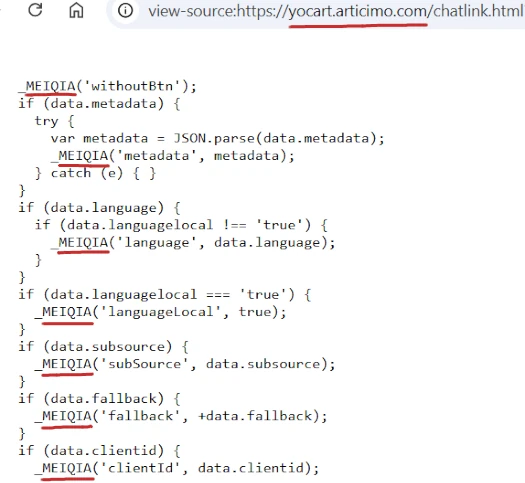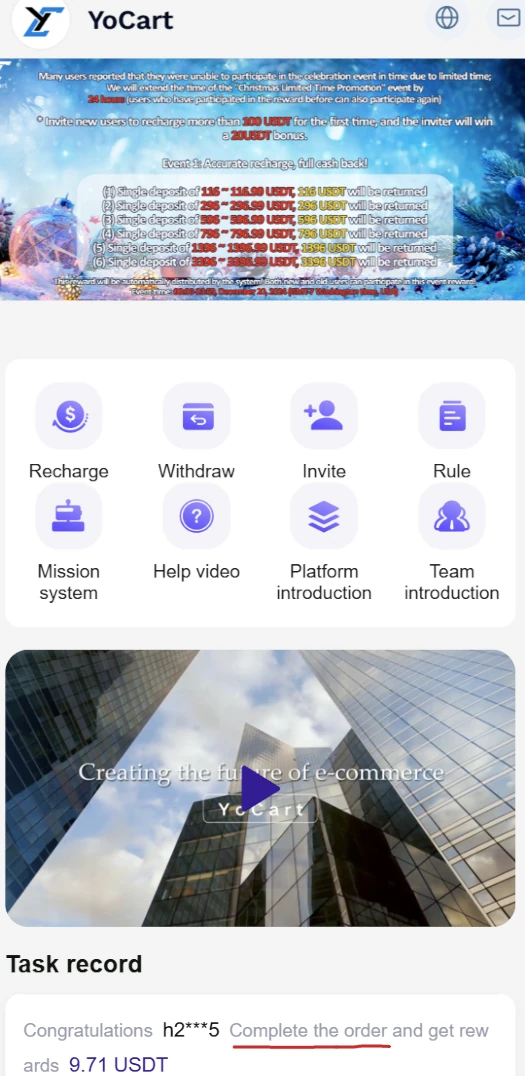YoCart Review: Fake orders “click a button” Ponzi
 YoCart fails to provide ownership or executive information on its website.
YoCart fails to provide ownership or executive information on its website.
YoCart operates from two known website domains:
- yo-cart.com (already abandoned) – privately registered on October 22, 2022
- yocart.articimo.com – first registered in 2003, private registration last updated on December 8th, 2024
If we check the source-code of YoCart’s website support page, we learn it runs on the Meiqia platform:

Meiqia is a Chinese software company based out of Beijing. This suggests whoever is running YoCart has ties to China.
As always, if an MLM company is not openly upfront about who is running or owns it, think long and hard about joining and/or handing over any money.
YoCart’s Products
YoCart has no retailable products or services.
Affiliates are only able to market YoCart affiliate membership itself.
YoCart’s Compensation Plan
YoCart affiliates invest tether (USDT). This is done on the promise of advertised returns.
- VIP1 – invest 35 USDT and receive 1.5% to 3% a day
- VIP2 – invest 500 USDT and receive 2% to 3.5% a day
- VIP3 – invest 3000 USDT and receive 2.5% to 4% a day
- VIP4 – invest 10,000 USDT and receive 3% to 4.5% a day
- VIP5 – invest an undisclosed amount of USDT and receive 3.5% to 5% a day
YoCart pays referral commissions on invested USDT down three levels of recruitment (unilevel):

Specific referral commission rates on each level are not disclosed.
Joining YoCart
YoCart affiliate membership is free.
Full participation in the attached income opportunity requires a minimum 35 USDT investment.
YoCart Conclusion
YoCart is yet another “click a button” app Ponzi scheme.
YoCart’s “click a button” Ponzi ruse is placing fictional orders with online retailers YoCart lies about having partnerships with.

Broken down, YoCart’s ruse sees affiliates log in and click a button. The more an affiliate invests the more times a day they have to click buttons.
This button clicking purportedly generates revenue via orders placed with online retailers.

YoCart receives a commission from the orders, which it represents it shares with affiliate investors.
If that makes no sense it’s because it doesn’t. Randoms clicking a button in an app doesn’t equate to genuine customer orders placed with online retailers.
In reality clicking a button inside YoCart’s app does nothing. All YoCart does is recycle newly invested funds to pay earlier investors.
Examples of already collapsed “click a button” app Ponzis using the same fake orders ruse are FluxCart, GMarket9 and PEB Express.
Since 2021 BehindMLM has documented hundreds of “click a button” app Ponzis. Most of them last a few weeks to a few months before collapsing
“Click a button” app Ponzis disappear by disabling both their websites and app. This tends to happen without notice, leaving the majority of investors with a loss (inevitable Ponzi math).
In the lead up to a collapse, “click a button” Ponzi investors also tend to find their accounts locked. This typically coincides with a withdrawal request.
As part of a collapse, “click a button” Ponzi scammers often initiate recovery scams. This sees the scammers demand investors pay a fee to access funds and/or re enable withdrawals.
If any payments are made withdrawals remain disabled or the scammers cease communication.
Organized crime interests from China operate scam factories behind “click a button” Ponzis from south-east Asian countries.
In September 2024, the US Department of Treasury sanctioned Cambodian politician Ly Yong Phat over ties to Chinese human trafficking scam factories.
Through various companies he owns, Phat is alleged to shelter Chinese scammers operating out of Cambodia.
Regardless of which country they operate from, the same group of Chinese scammers are believed to be behind the “click a button” app Ponzi plague.
Update 10th January 2025 – YoCart has collapsed. As at the time of this update YoCart’s website is no longer available.

